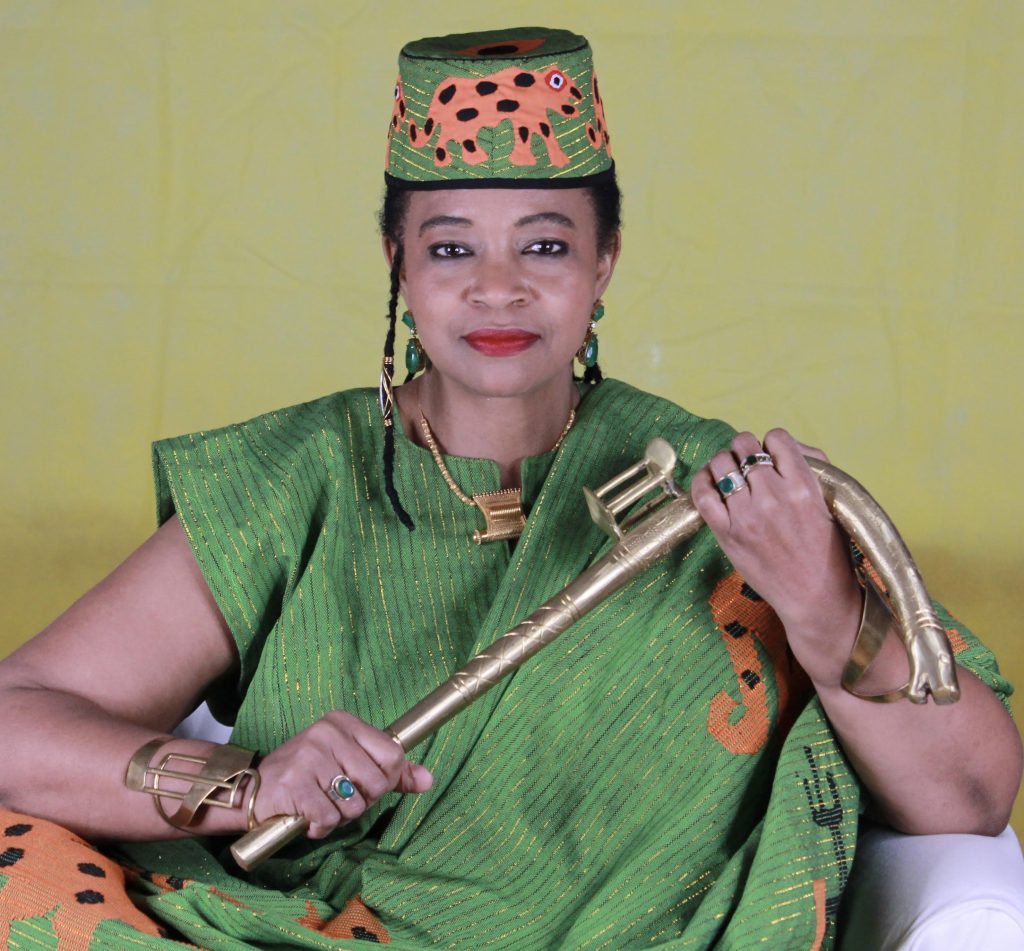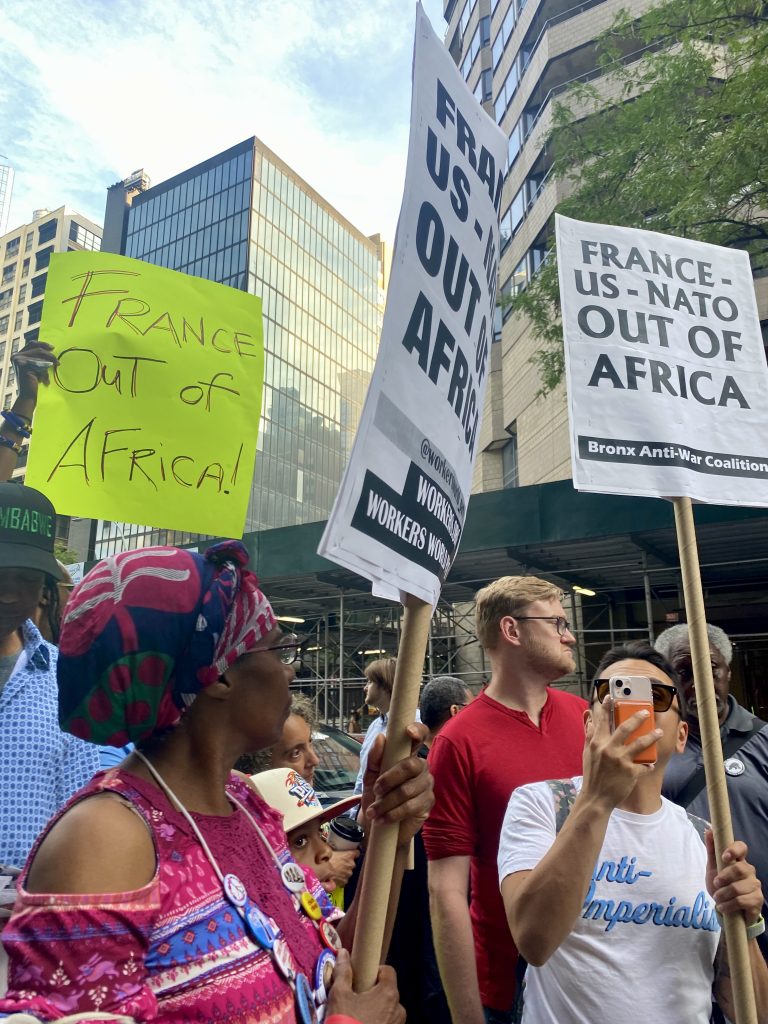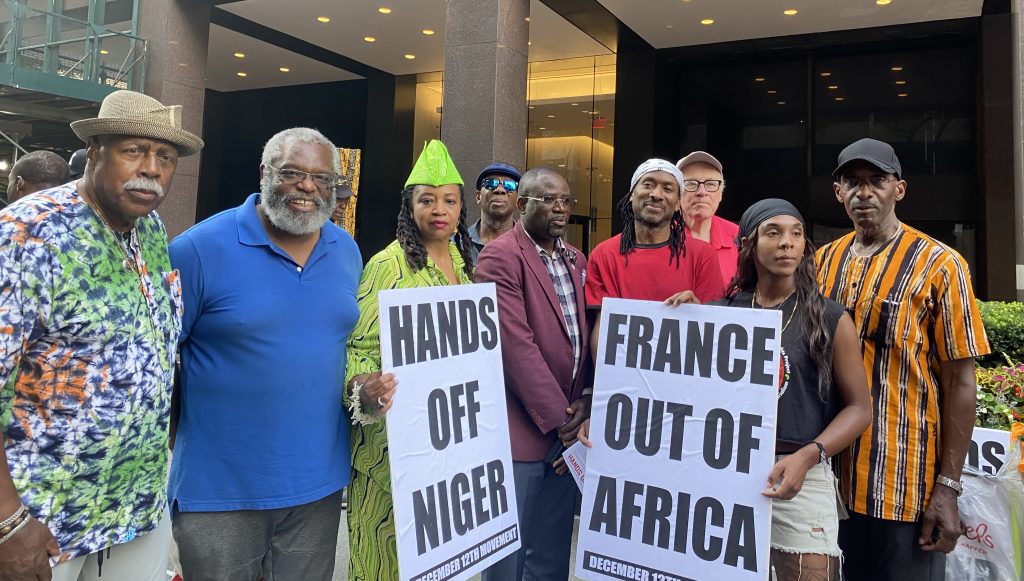Op-Ed by Dr. Dòwòti Désir


Recognizing the Beast: France’s Sustained Black Codes
By Dr. Dòwòti Désir
As the United Nations International Decade for People of African Descent 2015-2024, whose theme: Recognition, Justice and Development, approaches its end, will it be marred by war and acrimony by the global African community on both sides of the Atlantic? The daily barrage of aggression on the people of Niger, threats to their allies — Algeria, Burkina Faso, Mali, and Guinea Bissau — and a proposed UN plan to deploy 1000 Kenyan police officers to Haiti to work allegedly in collaboration with their counterparts on the island, promises enduring chaos among otherwise sister nations. In the Americas, this de facto occupation is actively being challenged by the Haitian people. These twin scenarios mark the start of a potential implosion of African and African descendant peoples among themselves. Matters have since been complicated by the suspension of Gabon from the African Union due to a recent coup d’état that took place within weeks of Niger’s coup and removal from over a half-century long dynastic rule of the Bongo Family. Understanding history is vital to understanding why these events are happening but there is also much more. [For centuries, the public policies, economic and military positions taken by various French governments have aggravated the lives of global African persons. However, the sentiments expressed in this article are less about being anti-French, but instead emphasizes a pro-African stand.]
The current situation begs the questions 1) What is countering the almost universally shared African values of Pan-Africanism? And 2) Are there forces interested in further splintering this narrative, namely nation states of the global North who profit from the asymmetrical power relations that have been in place since these countries’ mandates to destabilize the continent at the 1884-1885 Berlin Congo Conference, and the most strident act to abolish slavery, the 1791 Haitian Revolution?
The Decade (IDPAD) is an outgrowth of the 2001, World Conference Against Racism, Xenophobia and Other Forms of Intolerance (WCAR) and its seminal text, the Durban Declaration & Programme of Action Plan (DDPA) determined the transatlantic slave trade (and by extension colonialization,) is a crime against humanity that should have never occurred. With crimes against humanity, there are no statutes of limitations which consequently allows for the pursuit of reparations. The concept of inalienability as a matter of governance, human and civil rights, is at the heart of the decolonization process unfolding. There are fundamental items of concern regarding the illegitimacy of the actions of various states and the philosophical, juridical and political challenges they pose. The Berlin Congo Conference’s adverse impact on African sovereignty also lined the barrels of the quests for decolonization, reparations, and repatriation. In this instance, repatriation isn’t simply a return to one’s homeland but for Africans, a return to the rights of the soil, its wealth, and ability to profit from one’s proper resources.
A DISCOURSE OF DOMINATION
France has been a long-standing enemy of African peoples on both sides of the Atlantic. The notorious 1685 edict of King Louis XIV and Jean Colbert, le Code Noir (the Black Codes) – a critical juridical treatise of domination served to denigrate the African person by dehumanizing Black existence, and marketing and legalizing the status of Africans as chattel. The horror of this conceit spread throughout the Americas as, el Codigo Negro in Spanish spaces of control, and the, Black Codes in Anglo-speaking spaces of subjugation.
Guadeloupe, Louisiana, Martinique, San Domingue (later Haiti) among others, were the places most ravaged by the Code Noir. Following its historic victory in 1803, Haiti later became the experimental laboratory of the global North for how to asphyxiate a people economically, diplomatically and materially. Within the first quarter of the 21st century, France with the assistance of the African Union and CEDEAO is attempting to do the same with Niger: throttling a country who has forcefully asserted its sovereignty.
Two hundred years later, Africans who shared the same sense of community, nationhood, language, history found themselves victims of the Berlin-Congo Conference’s scramble for Africa. All of the sudden the peoples of these disparate lands were forced to accept English as their official languages; others French; still others German. They were sitting at squared desks instead of the community circles they historically used to acknowledge each other. Their traditional religions were devalued, and replaced with Abrahamic ones, ectara. There are other concerns however, those related to governance such as, to what extent were African governments or monarchs and traditional chiefs involved in the decision to redraw the lines of their jurisdiction? Were these traditional African authorities’ signatories to the agreements devised by the Europeans? If so, what were the terms and conditions made party to in these dubious arrangements?
The punitive and extractive behaviors were mastered and applied during France’s colonial exploits in the dissonant realm of Françafrique, i.e., France’s Africa — it’s playland — some 20 countries it holds hostage in a perverted and inequitable economic and market relationship under France’s domain, namely: Algeria, Benin Republic, Burkina Faso, Cameron, Central African Republic, Comoros, Djibouti, Gabon, Guinea, Ivory Coast, Mali, Madagascar, Mauritania, Morocco, Niger, Senegal, Togo, Tunisia, and Seychelles. The translation of France-Africa is also the ironic expression, France à fric. The word fric is slang for cash, money which is what Africa and Haiti have been for France — its treasury, mines, and reserves. The fric is the problematic relationship established with the Pacte Colonial (14 countries), which gives France full control of (its) African nation states. While political emancipation was granted, economic sovereignty was kept in a noose.
The Infrastructure of oppression has sustained itself for centuries however the fric has run its course. The current coups d’états are the natural outcome of the gravitas of French aggression. Most people associate the year 2020 with the global pandemic, but 2020 is also the year the monetary unit of Françafrique, the West African CFA, was to have been replaced with the ECO and elements of how it is accessed and produced would take control out of the French government’s hands. While certain challenges would manifest themselves, an independent currency would have given Africans greater control of their economies, eclipsing monetary fluctuations and developments in Europe, and placing a regional giant, Nigeria, in the driver’s seat.
The COVID-19 virus may have devastated the world’s economies but it saved France’s from certain ruination. The combined return of these efforts to break the post-independence arrangements like the, Pact Coloniale which forced African countries to: put their money into French banks; borrow their money from France at high interest rates; have African currency printed in France; and always give France the right to purchase raw and other materials before any other market – granting it perpetual first right of refusal is a game changer. Even with the ECO project on hold, with the formation of BRICS, and an eventual separate monetary unit devised by the global South, France and the global North shall have their monetary fists pried open. Within a few short years, France has the potential to slip into “Third World” status.
FAST FORWARD
The enslavement and colonization of Africans are crimes against humanity which should have never occurred. A basic question must be asked, does any structure built on a fundamentally illegal and unethical base have any political or juridical power to justify military, economic or other forced interventions on another state?
The 2022 Françafrique Summit made clear the nature of the line drawn between France and the current generation of Africans. Demographically Africa has the youngest continent in the world, yet it doesn’t give any government on the planet the right to infantilize the governments or peoples of the continent.
Democratically elected perhaps, but no longer what the people of Niger seek in leadership, Nigerien President Bazoum’s legitimacy was perceived as being compromised by the French government. He was removed. Yet, the US and France have conveniently forgotten how they participated in the coup d’état of the democratically elected Jean Bertrand Aristide, twice. Yet, who went to war against these countries? The definition of democracy speaks to systems of governance determined by the people. The most coup d’états taken place on any continent has been on the African continent. What does this tell us? Is it possible that democracy as defined by the West, is not the manner in which Africans have traditionally governed themselves? Or is there a hybrid model that the West refuses to acknowledge which has emerged in Africa?
Although now dissipating, the retaliatory threats currently confronted by the government of Niger by France and its allies in the CEDEAO (the Economic Community of West Africa) are ultimately about the sovereignty of African states; and the decolonization process coming full circle, namely, it is coming to an end. The issues raised by the replacement of former President Bazoum and his relationship to the government of Emmanuel Macron, is tied to the bigger issues of self-determination, and reparations for Africans on the continent and her Diaspora. The military ouster of Gabon’s 56 years dynasty, incarnate in former president Ali Bongo, confirms this vision. The tensions between Niger and France specifically are not unlike France’s posture towards racism. The imprescriptibility of France’s perception of how it has a right to use the power of the state for safeguarding its power and interests is a questionable ethos at the heart of its policies towards African descendants. In recent judicial proceeding for reparations demanded by the Martinican human rights and environmental justice organization, Mouvement International pour les Reparations (MIR), French courts maintain that racism is imprescriptible – it cannot be undone –and that they do not owe restitutions or reparations to Africans in the Americas.
It would appear that France believes that they have the right to pursue the same “Divinely endowed” behaviors in Niger and the rest of Africa. It is the same position taken when they demanded reparations from Haiti for their acrimonious actions enslaving, torturing and destroying the lives of Africans. It is the same disposition that implemented the dehumanizing edicts of the Code Noir in the 17th Century. France believes it has the right to place their foot on the necks of African peoples, their descendants and keep it there. CEDEAO must be able to recognize the nature of this beast and stand down. By agreeing to back France’s military stand towards the new government of Niger, all they had done, in complicity with the African Union’s agreement and expulsion of Niger and Gabon from its ranks, is affirm the deeply flawed and problematic position France has towards the African world, and people of African descent in general.
A form of Black on Black crime, all parties involved in aggressive acts towards Niger and its partners (Algeria, Burkina Faso, Mali) need to stop; stand down and examine the implications of their behaviors from a political, moral and legal position to understand what the implications are for the future. African countries, and those with large African/Afro-diasporic populations outside the continent can neither demand restitutions, reparations and the repatriation of objects and human remains, nor make way for the return of their peoples, if they are backing the positions and being party to a proxy war of a declining empire(s). A contradiction in thought, if the global African community thinks they are going to find African solutions to African problems and obtain true sovereignty and liberation, Europeans and the global North must relinquish control of the continent’s resources, its means of production, and its heads-of-state. Africans going to war and/or undermining each other’s sovereignty will undermine the reparations movement everywhere as the crimes against humanity (the annexation of social space, and extraction of resources, human and otherwise) gets perpetuated by the victims themselves.
THE SLIGHT OF HAND
The potential of an implosion within its nation states, i.e., African fighting against each other, is a trap that annihilates the fundamental principles of pan-Africanism. Constructs that have formally been in place since the Haitian Revolution and its constitution of 1805 which provided a space of liberty and freedom for all Africans who could make it to its shores. This problem includes the decision of Kenya to send 1000 police officers to Ayiti to allegedly assist Haitian police officers fight gangs in streets of the greater metropolitan area of Port-au-Prince. Let us note, that the so-called gangs are in fact paramilitary organizations fighting however guised a civil war in the capital.
Calling them gangs insults the nature of power (however illicit), organization, and resources they possess. More importantly it dismisses the true culprits of social and economic violence in the country: the oligarchs, and foreign interests such as France who are without credibility. Follow the money to identify the hoarders of power who seek to steal the resources of that country. The same sleight of hand: accusing armed personnel with a clear mission of being illegitimate in Niger, when it is the foreign non-African entity, whose presence must be questioned. (This does not make those who want the diminished presence of these powers xenophobes but simply underscores the right to sovereignty of Africans and their sister states.) We must see the beast for what it is and its various manifestations.
REPARATIONS
How these complications are resolved is going to have a long term and radial impact on, if and how African descendants will obtain reparations. Reparation isn’t just about providing compensation for the enslavement of Africans but it is also about its parasitic twin, colonization. Evidence of the continued impact of enslavement plays itself out systemically and structurally in the global monetary and aid systems; foreign policies; and the material evidence of the museums of the global north. The destruction that was done against African people during the Great Suffering, and countless spaces of weeping in Europe, the Mid-East, and the Americas, as African personhood and families were destroyed is a trauma genetically imprinted that needs repair. Each generation of global African persons recognizes this and thus the demand to “Dégage!” (Get lost! Kick rocks!) to France in particular grows louder.
People of African descent are taking ownership of their own pain, the tragedy and reality of being prisoners of war within and outside the boundaries of their host countries. Embracing this pain permits personal and societal healing. The ability to craft solutions to not only prevent this from happening again in the future, as it is the guarantee of non-repetition of injury to our persons; our psyches; our collective sense of self; our physical bodies; but also, the material, the intellectual and spiritual aspects of culture — all those things that formulate our histories, that define our humanity, is the essence of reparatory justice. The guarantee of non-effacement of our histories – in their fullness and complexities – is linked to deconstructing the mindset and policies that created the Code Noir/Black Codes. It’s when we can do that is when we will truly be free, we shall truly be liberated, that we can find concrete steps, measure, modalities for healing and re-establishing other foundation for free and executing concepts for principles we should dear such as family, collective living, Pan-Africanism.
The sustained impact of enslavement and colonialism is also evident in the recidivist behavior of France. Their dispositions have not changed towards Africans. What is done to our nation states at the macro level reflects what happens to us as Africans on a micro level as individuals. Individual acts of cruelty accumulate into the grievances expressed in our collective communities…it is why African descendants need to urge governments to go back to the Durban Declaration and Programme of Action Plan; and Taubira’s Law ironically passed in France. These mandates must be incorporated into the constitutions of AU member states impacted by the kidnapping, enslavement and trafficking of African persons.
The battle of reparations for the global African community, meaning Africans and their descendant communities, must re-establish systems for countering deeply flawed, immoral and the sadistic policies but also put systems in place where they can grow, live, and thrive by African- /Afro-oriented terms. Recognition, justice, and development being self-determined allows global African communities to live brightly in our own truths.
We Africans must fight, we find it necessary. And we know we shall win, for we are confident in the victory of Truth over Evil.
– Bob Marley, Exodus
Dr. Dòwòti Désir is the Queen Mother of the African Diaspora, Bénin Republic. She lives in the United States of America and West Africa. A human rights activist, interfaith leader, and writer, she has documented sites of consciousness throughout Africa, the Americas and Europe as they relate to the capture and kidnapping of Africans across the Atlantic. For more information about the author, visit www.queenmotherdowoti.org

